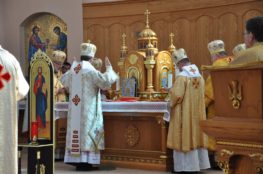The following is an excerpt from a translated article by Fr. Sergey Golovanov, a Russian Greco-Catholic priest concerning the 1920 Jesuit mission to Istanbul, Turkey. The full text can be read over at the Holy Unia web-log here. (Thanks to Fr. Athanasius McVay for bringing it to my attention.)
In 1920, the superior general of the Society of Jesus ordered Fathers Baille, Jansseand, and Tyszkiewicz to go to Georgia. The war prevented the Jesuit missionaries from reaching their goal and stopped them in Istambul, where there were many thousands of Russian refugees. All Russians felt anxious and feared an attack by the Bolsheviks or extradition back to Soviet Russia. With the cooperation of the occupational administration of the Entente, the Jesuits organized relief action among Russians. Lois Baille, SJ, founded St. George’s Residential School for orphans. He appointed a Russian Latin-rite priest, Sipiagin, as director of the school. Sipiagin came from a family with mixed Russian-Polish origins. He was enthusiastic about the Latin rite and Western culture. Stanislas Tyszkiewicz, SJ, set up a hostel for Russian proselytes. He taught the Catholic Catechism. The proselytes passed an examination after several months, repudiated Orthodoxy, made a profession of Catholic faith and communicated at a Latin-rite Mass. The Jesuits stimulated the transit of Russians into the Latin rite. Tyszkiewicz enrolled paid secret informers among Russians to control the situation. He had many secret contacts with persons among the Orthodox intelligentsia and suggested making conversion to Catholicism a condition of any financial help. Many Russians angrily rejected the unbecoming proposals of Tyszkiewicz. Fr. Sergiy Bulgakov was disappointed in Catholicism after the meeting with Tyszkiewicz: the great universal idea of St. Peter’s ministry boiled down to mere proselytism. Tyszkiewicz was a Pole by origin and wrote many articles under the Russian pseudonym, Serge Bosforoff, where he called on Russians to convert to the Roman Catholic Church. He used the emigrants who received charitable help for his own purposes. He wrote a provocative «Open letter of the Thirty Russian Catholics to Orthodox Metropolitan Anastasiy Gribanovskiy», and used the names and signatures of those Russian people whom he had aided. This scandalous action compromised the idea of Catholicism among Russian intellectuals, who had sympathized with it earlier in the spirit of the philosopher, Vladimir Soloviev.
In 1922, Fr. Gleb Verhovskiy came to Istanbul at the direction of the Oriental Congregation. He set himself at variance with Tyszkiewicz owing to such improper methods of missionary activity and urged the conservation of Byzantine-rite status for all Russian proselytes. The Jesuits made Fr. Verhovskiy’s situation very moral uncomfortable, and obliged him to leave Istanbul.
The most scandalous action committed by Tyszkiewicz involved sending a group of Russian young people to study in France and Belgium with stipendiums from the Catholic Church. Tyszkiewicz came from a very aristocratic family, and normally tended to give excessive importance to other aristocrats. He appointed a former courtier and aristocrat, Nikolay Burdukov, as a curator of the group. All the Russian settlement in Istanbul was scandalized and moved to laughter by this appointment. Nikolay Burdukov was famous in high society as a sodomite with the telling alias «princess Mescherskaya.
I’m quoting this article excerpt on Opus Publicum for three reasons.
First, despite what the situation may be today, this debacle serves as an important illustration of just how poorly the Society of Jesus often handled its encounters with non-Catholic Eastern Christians, particularly the Orthodox. Rather than respect their traditional rites and spiritual patrimony, they frequently attempted to foist a particular brand of Latin Catholicism on their would-be proselytes, which did very little to win much sympathy toward unity with the Catholic Church. Compare this with the missionary efforts of Blessed Bishop Mykola Charnetsky and other Redemptorists working in Ukraine to bring the Orthodox back into the Catholic fold. Rather than attempt to equate “Latinism” with “Catholicism,” they adopted the form of the Byzantine Rite in use among the Russian Orthodox in the hopes of demonstrating that to be Catholic does not not mean sacrificing one’s authentic traditions.
Second, there was genuine interest among certain segments of late 19th/early 20th century Russian society for unity with Rome. After seeing how the Russian Orthodox Church had become little more than a handmaid of the Russian Imperial state, only Rome proved to be a truly independent ecclesiastical force working in the world; standing up to the onslaughts of liberalism; and refusing — at least until the 1960s — to forego the social rights of Christ the King in favor of a “safe compromise” with secular powers. Even Fr. Sergius Bulgakov, who eventually became a fierce critic of certain Latin Catholic doctrines, was interested in joining the Catholic Church after his exile by the Soviets, though clearly that never came to pass.
Last, there are far too many (traditional and some conservative) Latin Catholics today who seem to think that the Church should approach the Orthodox in a manner not dissimilar from the Jesuits recounted above. Given the suspicion in which many of the Orthodox now hold the Catholic Church, coupled with the Latin Church’s demolition of its liturgical patrimony, that’s never going to work. Yes, some individual Orthodox priests and laity do choose to unite themselves with Rome, but often only after wading through a great deal of nonsense. (Those fortunate enough to have access to a Greco-Catholic parish tend to have an easier time of it.) This is why true ecumenical dialogue — understood as a necessary step toward re-unification — is neither a waste of time nor a betrayal of the Catholic Faith. Before unity can become a reality, centuries of misunderstandings and political animosity have to be swept away. While Catholics — Latin or Greek — should continue to witness to their estranged Orthodox brethren and never compromise the Faith, they should do so with patience and charity. In other words, don’t follow the historic lead of the Jesuits.




May 16, 2017
St. Andrew Bobola, pray for us!